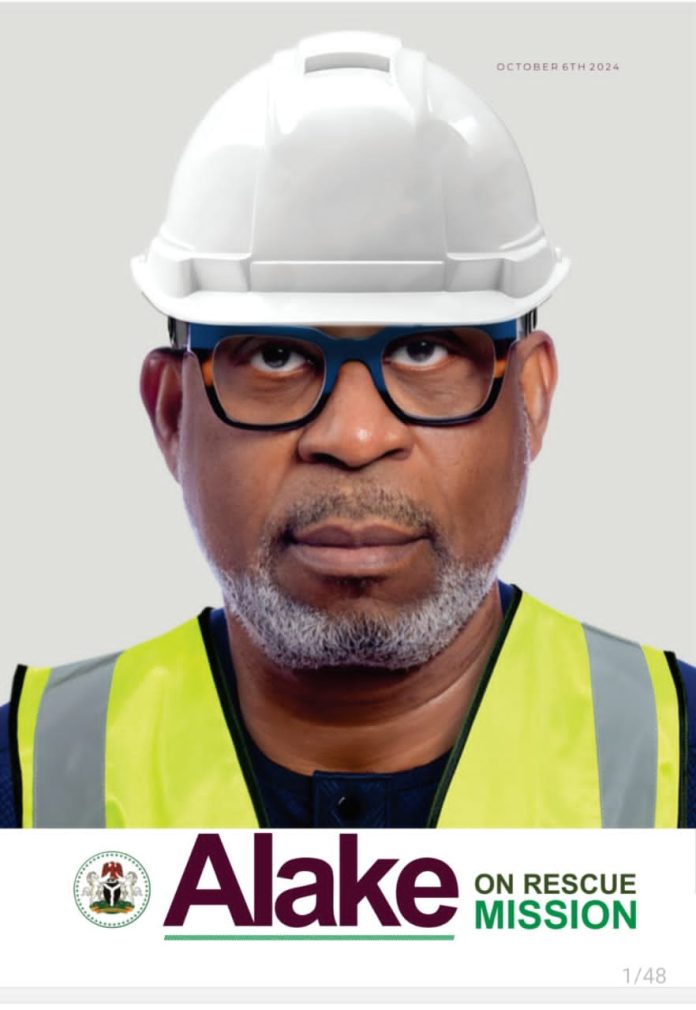By Tunde Rahman
“Alake on Rescue Mission” is much more than a photo book of activities, events and work of the Minister of Solid Minerals Development, Dr. Oladele Henry Alake, in one year in office. It’s a serious-minded and exciting piece of writing on the minister’s stewardship.
If you see it as the official book on the Minister’s achievements in one year in office, you will hit the nail on the head. Appointed on August 15, 2023, Dr. Alake has spent around 14 months as Minister of Solid Minerals, meaning one year has actually passed on his watch of the ministry.
The book’s release was also planned to coincide with the minister’s 68th birthday on Sunday, October 6. However, the organisers of this book launch missed this date by a few days. Perhaps this was deliberate.
Because the book is on Alake’s stewardship, hard as one may try, it will be difficult to separate its contents from Alake’s scorecards. Both are mutually inclusive and as such, a review of the book also means an evaluation of the minister’s one year in office.
The 46-page book, which includes 24 articles, 34 pictures, and two appendixes, gives an account of all that has happened under Alake’s watch of the ministry. It presents a holistic idea of the changes that have been brought to bear on the mining sector in just one year.
In the first article, written by Mr. Kehinde Bamigbetan, the minister’s special adviser, we were taken through Dr Alake’s seven-point agenda for the ministry. Fashioning out a seven-point agenda within the Solid Mineral Development component of President Bola Tinubu’s Renewed Hope Agenda underscored the seriousness with which Minister Alake had approached his assignment.
Many of us here recall the shock and trepidation that greeted the appointment of Dr. Alake, a media and communication expert and brilliant strategist, as Minister of Solid Mineral Development on August 15, 2023. Naysayers had predicted that Alake would find it difficult to find his feet in the technical field of mining, where geologists and mining engineers hold sway. Indeed, the strategic importance of the mining sector to the country can hardly be over-emphasised.
According to official data, Nigeria is said to be endowed with over 40 types of minerals including gold, silica, lead, marble, tin ore, zinc, coal, iron ore, granite, laterite, manganese and limestone.
Nigeria sits on mining reserves worth $750billion following a preliminary report on assessment of the mining potentials by a German firm, GeoScan.
But the sector remains under developed, accounting for only 0.3% of Nigeria’s GDP.
So given the mining sector’s strategic place in the nation’s development goals and its potential to be a significant revenue earner for the country, President Tinubu might have decided to put in charge of the sector a trusted ally, a patriot, and an incorruptible man who he knew would make the difference.
Bamigbetan writes that Alake’s forte is strategy. It can be argued, and rightly, too, that one can conquer any ground with planning and strategy. Has Minister Alake mastered and conquered the mining sector? I will soon return to this vital question.
In the following three articles in the book, namely “Working with Dr Dele Alake,” “Celebrating Dr Henry Oladele Alake,” and “Driving us to Aim Higher,” three top public officers working with Dr Alake, including the Permanent Secretary in the ministry, Dr Mary Ogbe; Director-General, Mining Cadastral Office, an agency under the ministry, Engineer Simon Nkom; and the Head of Solid Minerals Development Fund respectively narrated their experience working with the minister, while also highlighting their roles and responsibilities within the ministry.
The trio seemed to be unanimous in their verdict. Permit me, however, to quote the Perm Sec: “Dr Alake’s unwavering dedication to Nigeria and excellence is something that we all strive to emulate as we work together to realise the full potential of our nation’s solid mineral sector.”
Writing on the topic “Dele Alake and the Power of Positive Influence,” Senior Special Assistant to the President on Media and Publicity, Temitope Ajayi, in his contribution to the book, harped on the close relationship between President Tinubu and Dr. Alake. He surmised that “for many aides, associates, cabinet colleagues and friends of the President who have suggestions and advice for the President and cannot immediately reach him, Mr Alake is the go-to, knowing he has the ears of the President and will never shy from offering sound advice to him.”
It is noteworthy to mention a couple of other articles like the “Investment Report,” which gives an update on the situation with respect to foreign investment within the mining sector. There is also a plethora of other articles, spotlighting the media and its relationship with the ministry like “Alake in the Eyes of the Media,” “Broadcasting Mining” and “Boosting Mining with Digital Media” among others.
What they all signpost is a good relationship with the ministry and a promise of more support.
Perhaps, a more interesting and instructive feature of the book is the addition of two articles written in those dark days of the military by Alake in his columns in the defunct National Concord. In “Civility in Public Appointments” published on November 23, 1987 and “Needed, a Cautious Economic Policy,” penned on March 13, 1989, the readers confront the firebrand and irrepressible activist who spared no word in condemning military regimes and their policies. If hitherto, many of those gathered here witnessed the sharp tongue of Mr. Alake against political opponents particularly during the campaign for the election of President Tinubu, now they would encounter his sharp pen as well.
In all, distinguished ladies and gentlemen, the leading article, bearing the title of the book “Alake on Rescue Mission” gives us a helicopter view of Dr. Alake’s watch in the ministry and impact in one year, and thus offers us room for interrogation.
The minister drew up a seven-point agenda. The first component, and perhaps the most important of the 7-point agenda, is the formation of the Nigerian Solid Minerals Corporation (NSMC). Realizing that attracting big investors is a major challenge of the sector, Bamigbetan tells readers that the NSMC “is the face of the Nigerian Mining Sector in the global business space, the go-to company for transactions and the deals to deepen the capital formation that will keep investors coming.”
The book reveals that the minister had sought to avoid the pitfalls of the defunct Nigerian Mining Corporation in coming up with the structure by comparing the Nigerian National Petroleum Corporation with the Nigerian Liquefied Natural Gas, NLNG, company.
Bamigbetan writes that “Leaning towards the latter, the minister is proposing a NSMC with 25 percent shares held by the Federal Government of Nigeria, 25 percent by Nigerians through a public offer, and 50 percent by private corporate placement with the condition that no private placement exceeds 10 percent.”
It is important to note, however, that more than one year down the line, the NSMC is still in the works.
The question can be asked also as to whether foreign investments have rolled in into the mining sector. Following the Investment Report on Pages 11 to 14, there is cheering news. Under Alake’s watch,Nigeria has seen a steady rise in companies establishing mineral processing plants in the country. For example, in April 2024, the minister attended the commissioning of the Asba Group’s lithium processing plants, which is said to worth $50m and in a follow-up letter to the minister, further investments in a tin/tantalite processing plant worth $146m and a Tin/Columbite processing plant in Bauchi State worth $67m are underway to bring the group’s investment to approximately $263m.
There is also the $5m, which is already in Nigeria Lithium pegmatite belt of Kwara, Niger and FCT Abuja, by Canada-based Orosur Mining through its UK subsidiary Lithium West Limited as well as the commitment of Woodcross Resources to establish a tin refinery in the country, which will be the first of its kind.
However, it does appear that some of the factors that will attract investors to the sector may not be solely within the realm of the ministry. The government’s fiscal policies, business environment and economic situation in the country must mesh with the arrangements put in place by the ministry to attract more genuine investors.
With respect to the second component of the agenda, the countrywide geological exploration of key minerals, to de-risk the investment and ensure the government acquires the precise geological data, the ministry had proposed N70 billion to the National Assembly in its budget. This important project is still being hampered by funds. As we say in this country, Nigeria may have happened to the ministry.
The minister has, however, recorded remarkable success in the area of the establishment of the Mining Marshals and introduction of satellite technology to monitor mining operations among others. On March 20, Alake inaugurated the Mining Marshals, drawn from the Nigerian Security and Civil Defence Corps, in conjunction with the Ministry of Interior. With 60 officers per unit per the Federal Capital Territory and each of the 36 federation states, the Mining Marshals took off with 2,220 units. About a month later, the NSCDC boosted the Marshals with 350 additional 350 officers.
Given his commitment towards the resurgence and full development of the mining sector in Nigeria and Africa, Alake was also elected as the pioneer Chairman of the African Minerals Strategy Group, whose formation he spearheaded. Alake’s appointment to lead the group is a testament to his excellent leadership in the sector.
Putting the book “Alake on Rescue Mission” together, in the final analysis, is commendable. The book will be an invaluable resource for students, scholars, administrators, miners, and investors seeking knowledge and information about the ministry, its activities, and its offerings.
The content is rich, while the quality is high. Save for some identifiable typos, each article is a piece of good, clear, well-structured and easy-to-read writing. Its high aesthetic quality is also typical of the man the book is arranged to honour.
The jury is out on the minister’s performance in office. But has Minister Alake discharged himself creditably thus far? I think so. Alake has lived up to the billing. He has worked the path trodden by seasoned journalists like Dr. Nnamdi Azikwe, Chief Obafemi Awolowo, Chief Bisi Onabanjo and Alhaji Lateef Jakande, all of blessed memory and, of course, Dr. Christopher Kolade and our own Aremo Olusegun Osoba who all made the difference in public office. Looking at my crystal eyeball, even at 68, the future is still ahead of Dr. Alake.
On this note, I would also like to wish him many more years and robust health so he can continue offering our country more valuable services.
I thank you all for listening to me.



















